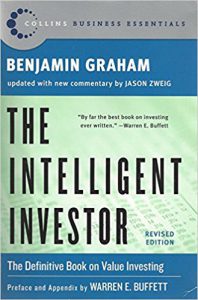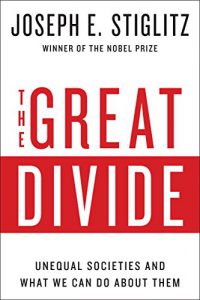Investing is a fundamental act for all people. You are investing your money when you buy something. You are investing your time and effort to your company you are working at. I think we all need to know about investment even if you are not a professional investor. So I picked up this book to read. Warren Buffett describes this book as the best book on investing ever written.
I’m now reading:

The Intelligent Investor: The Definitive Book on Value Investing, Revised Edition
by Benjamin Graham
Excerpts
‘The sillier the market’s behavior, the greater the opportunity for the business-like investor. Follow Graham and you will profit from folly rather than participate in it.’
‘Ben Graham… expressed to a friend the thought that he hoped every day to do “something foolish, something creative and something generous.”‘
from the “Preface to the Fourth Edition” by Warren E. Buffett
One of Graham’s principles:
‘The market is a pendulum that forever swings between unsustainable optimism (which makes stocks too expensive) and unjustified pessimism (which makes them too cheap). The intelligent investor is a realist who sells to optimists and buys from pessimists.’
from “A Note About Benjamin Graham” by Jason Zweig
| 2017/05/13
| Finance & Economics, Notes
|
Joseph E. Stiglitz is one of my contemporary economist heroes. Others are Paul Krugman and Thomas Piketty.
I’m now reading:

The Great Divide: Unequal Societies and What We Can Do About Them
by Joseph E. Stiglitz
The summary of ‘Prelude: Showing Cracks’
The book begins with the onset of the Great Recession. The first selection was published in Dec 2007 when US economy slipped into a downturn
The making of the Great Recession is intimately connected with the making of America’s great divide
After the tech bubble broke, US economy slid into recession in 2001. George W. Bush’s remedy was a tax cut especially aimed at the wealthy
Clinton had put off investments in infrastructure & education & helping the poor in the name of deficit reduction, for which I was worried
I was already concerned about the country’s growing inequality, and these inequitable tax cuts only made matters worse
Inequality weakens total demand & the economy. US’s inequality was moving money from the bottom to the top, and those at the top spent less
Naive market fundamentalists who believe markets are always efficient unleashed a bubble, and their monetary policies led to inequality
The Fed kept the economy churning with a policy of low interest rates and lax regulations, which worked only by creating a housing bubble
When the Fed raised interest rates in 2004, I anticipated the bubble would break, but it took 2 yrs for the full effects to be realized
The crisis was man-made and something that the 1 percent did to the rest of us, which itself is a manifestation of the great divide
| 2017/03/11
| Finance & Economics, Notes
|


